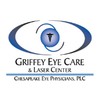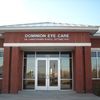
At Griffey Eye Care & Laser Center in Chesapeake, Virginia, our doctors and staff are dedicated to providing you with the most thorough, gentle, and modern service for your eye care needs. With over 50 years of combined service and experience in coastal Virginia as well as North Carolina we are dedicated to helping you see clearly.
Our highly-trained staff provide our patients with the most up-to-date technical and surgical techniques, with a personal touch. We take the time to ensure that each of our patients are fully informed of their options regarding cataract surgery, glaucoma treatment, vision correction, PRK or LASIK Surgery, eyeglasses, contact lenses, preventative or ongoing care, and whatever is needed to ensure the best eye care possible.
Our highly-trained staff provide our patients with the most up-to-date technical and surgical techniques, with a personal touch. We take the time to ensure that each of our patients are fully informed of their options regarding cataract surgery, glaucoma treatment, vision correction, PRK or LASIK Surgery, eyeglasses, contact lenses, preventative or ongoing care, and whatever is needed to ensure the best eye care possible.
Services
A Cataract is a clouding of the eye's naturally clear lens. The lens focuses light rays on the retina - the layer of light-sensing cells lining the back of the eye - to produce a sharp image of what we see. When the lens becomes cloudy, light rays cannot pass through it easily and vision is blurred.
The retina is a very thin, but complex tissue that lines the back of the eye. It is composed of millions of cells, including photoreceptor cells that sense light and send images to the brain. There are many conditions that can impair the retina's ability to receive and transmit images. The most common retinal diseases are Diabetic Retinopathy, Age-Related Macular Degeneration and Retinal Detachments.
Glaucoma is a disease of the optic nerve - the part of the eye that carries the images we see to the brain. The optic nerve is made up of many nerve fibers, like an electric cable containing numerous wires. When damage to the optic nerve fibers occurs, blind spots develop. These blind spots usually go undetected until the optic nerve is significantly damaged.
If you are less than 40 years old and have no medical or eye conditions, you need an Eye Exam about every two years. If you are over 40 years old or have any medical or eye conditions, a yearly exam is very important. Note: it is very important for diabetics, regardless of age, to have a complete dilated exam yearly.



